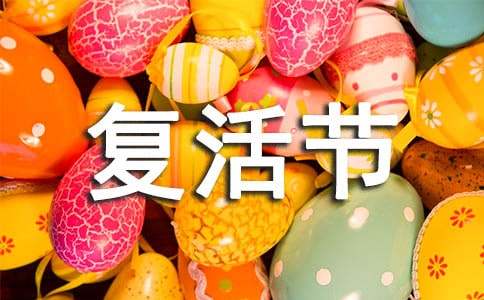復(fù)活節(jié)英語作文
導(dǎo)語:在西方國家,復(fù)活節(jié)是一個(gè)重要的節(jié)日圣誕節(jié)后。下面是小編為大家?guī)淼膹?fù)活節(jié)英語作文,希望對(duì)大家有所幫助。

復(fù)活節(jié)英語作文1
In western countries, Easter is a major holiday after christmas. According to "the Bible - Matthew" argument, Jesus Christ, Christ was crucified and died three days after the resurrection, and thus the establishment of easter.
在西方國家,復(fù)活節(jié)是一個(gè)重要的節(jié)日圣誕節(jié)后。根據(jù)《圣經(jīng)馬太福音》的說法,耶穌基督,基督被釘死在十字架上,死后三天復(fù)活,因而復(fù)活節(jié)的建立。
Easter commemorates the resurrection of Jesus, one of the most important Christian festival is. Three and a half years, his patient, preaching, cast out the demons, to help all people in need, will be the reason that the kingdom to listen. Until Gods arrangements to Jesus Christ was betrayed, disciples of Judah, was arrested, interrogated, Rome and was crucified, died before the predicted three days later will rise. And on the third day, the resurrection of Jesus! According to the interpretation of the Bible, Jesus Christ is the incarnate Son of God, the world in order to redeem the sins of the world, become the scapegoat of the world, which is why Easter is so important.
復(fù)活節(jié)是紀(jì)念耶穌復(fù)活,其中最重要的基督教節(jié)日。三年半的時(shí)間里,他的病人,傳道,趕鬼,幫助有需要的人,將是英國聽的原因。直到神的安排,耶穌被出賣,門徒猶大,被逮捕,審訊,羅馬和被釘死在十字架上,之前預(yù)測(cè)的三天后會(huì)死。到了第三天,耶穌的復(fù)活!按照圣經(jīng)的解釋,耶穌基督是上帝的兒子道成肉身,世界為了贖世人的罪,成為世界的替罪羊,這就是為什么復(fù)活節(jié)是如此的重要。
復(fù)活節(jié)英語作文2
Easter is the most important religious feast in the Christian liturgical year. Christians believe that Jesus was resurrected from the dead two days after his crucifixion, and celebrate this resurrection on Easter Sunday, two days after Good Friday. The year of this resurrection is variously estimated between the years 26 and 36 AD (see also Chronology of Jesus). Many non-sectarian cultural elements, such as the Easter Bunny, have become part of the holiday‘s modern celebrations, and those aspects are often celebrated by many Christians and non-Christians alike.
復(fù)活節(jié)是基督教禮拜儀式的一年中最重要的宗教節(jié)日。基督徒相信耶穌從死里復(fù)活后的.第二天他被釘死在十字架上,并在星期日的復(fù)活節(jié)慶祝這個(gè)復(fù)活,兩天后的星期五。這個(gè)復(fù)活的年是不同的估計(jì)之間的26年和公元36年(見年表耶穌)。許多非宗教的文化元素,如復(fù)活節(jié)兔子,已成為節(jié)日的現(xiàn)代慶祝活動(dòng)的一部分,這些方面往往是慶祝許多基督徒與非基督徒。
復(fù)活節(jié)英語作文3
Since its conception as a holy celebration in the second century, Easter has hadits non-religious side. In fact, Easter was originally a pagan festival.
The ancient Saxons celebrated the return of spring with an uproarious festival commemorating their goddess of offspring and of springtime, Eastre. When the second-century Christian missionaries encountered the tribes of the north with their pagan celebrations, they attempted to convert them to Christianity. They did so, however, in a clandestine manner.
It would have been suicide for the very early Christian converts to celebrate their holy days with observances that did not coincide with celebrations that already existed. To save lives, the missionaries cleverly decided to spread their religious message slowly throughout the populations by allowing them to continue to celebrate pagan feasts, but to do so in a Christian manner.
As it happened, the pagan festival of Eastre occurred at the same time of year as the Christian observance of the Resurrection of Christ. It made sense, therefore, to alter the festival itself, to make it a Christian celebration as converts were slowly won over. The early name, Eastre, was eventually changed to its modern spelling,Easter.
【復(fù)活節(jié)英語作文】相關(guān)文章:
復(fù)活節(jié)英語作文:復(fù)活節(jié)的起源04-12
復(fù)活節(jié)的英語作文04-12
復(fù)活節(jié)高考英語作文04-09
復(fù)活節(jié)的來歷英語作文04-10
有關(guān)復(fù)活節(jié)的英語作文04-10
關(guān)于復(fù)活節(jié)的英語作文04-03